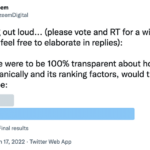Reading Time: 2 min Keeping users engaged on your website is vitally important, but Google says it doesn’t affect your rankings. I suspect they want it to, but they don’t have a good way to tie your site engagement to the rankings. The problem for Google is two-fold: If you have Google Analytics on your website, which captures many […]
SEO
Internal linking is crucial for your website
Reading Time: 2 min When Google reveals a bit of information about how their search algorithm works, the words they use are very important. For example, last year Google’s Gary Illyes mentioned that website speed is a “teeny tiny factor” in ranking, which came as a surprise to many people. It’s very important for user experience, but isn’t a […]
More content doesn’t mean more traffic, except when it does
Reading Time: 2 min If you’re striving to get your site to rank higher in Google, you often hear two big things: Google loves more content and Google loves fresh content. Neither are necessarily true, though they’re not necessarily false either. For the sake of simplicity, let’s consider “more content” and “fresh content” to be the same thing. If […]
15% of all searches on Google are still brand new
Reading Time: < 1 min Over the years, Google has frequently shared that a large percentage of the searches on their site are for phrases they’ve never seen before. This is heavily related to search queries getting longer, which I first talked about 13 years ago and continues to progress to this day. As of right now, 15% of all […]
Google being less transparent can be a good thing
Reading Time: < 1 min For decades, there have been calls for Google to be more transparent about how their search algorithm works. While it’d be essentially impossible to share because it’s so wildly complex, even if sharing was possible it might still be a bad idea. In a recent Twitter poll, search engine experts were asked about the impact […]
Does “near me” help your website rank better?
Reading Time: 2 min Many people include the words “near me” when performing local searches on Google, such as searching for something like “car dealer near me”. Google understands this, and essentially extracts “near me” and just runs it as a local search, which makes sense. However, if Google treats it that way, does it make sense to include […]
More data = less value
Reading Time: < 1 min Our agency is a big believer in data. We track website metrics, social media metrics, email marketing metrics, and pull in great tools like heatmaps to take things even further. However, a problem that can quickly arise is having too much data. It’s easy to build a giant report that shows everything, but the result […]
If you have toxic links pointing to your website, just ignore them
Reading Time: < 1 min If you run auditing tools on your website, they’ll often find “toxic” links (from spammy sites) that link to yours, and advise you to work to get rid of those links. While those links won’t do you any good, they’re not worth worrying about. Generally speaking, your best course of action when you find those […]
Website themes are not content
Reading Time: < 1 min When building websites, people are often concerned about not duplicating content across pages or sites. While there is no specific penalty for that, if Google thinks your website has the same content as another site, one of you won’t have a chance in the rankings. So what does that mean for website themes and templates? […]
Google may let machine written language rank soon
Reading Time: < 1 min There is a growing number of tools out there that can write (or at least help write) content for your website. As of today, that kind of content goes against Google’s guidelines — but probably not for long. According to Google’s John Mueller: From our guidelines it is the case that if it’s automatically generated […]









